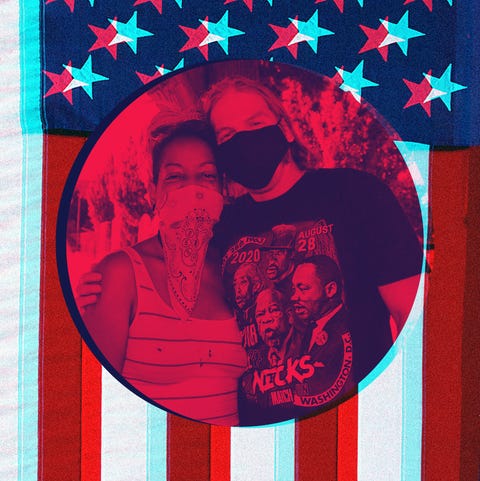
Interstate 90, somewhere in Washington: I saw a white Dodge Charger on the opposite side of the highway. I
was driving west, he was driving east. About 1,000 feet ahead, just before a median U-turn for authorized vehicles only. No distinguishing marks. As I got closer, the car sped up. Moments later, I passed the car—which now had turned in at the U-turn. Within a blink, the car was directly behind me—red and blue lights beamed out the rear-view.
My foot clicked over to the break, and I crawled to the shoulder. Confused, and scared.
My mind shuffled through reason after possible reason: It had to be something with the car itself, because I had it on cruise control at the limit of 70. Maybe I should’ve gone with the Kia, not this showy SUV. The front didn’t have a license plate—maybe that? Emissions sticker (but how could he see that)?
Ba-bum. Ba-bum. My heart couldn’t handle any of it. Not after the downloads of my lost brothers and sisters; Sandra Bland weighed on me most—I actually thought about her in this moment, as the car slowed. I felt my chest tighten, which is very unlike me. I don’t fret.
He got out of his car.
He was white.
As he got closer to the side-view mirror, I gave myself a pep talk. Whatever you do, don’t move. Stay still, and try to smile.
He greeted me: Why were you going so fast?
Ba-bum. Ba-bum.
He asked the question again, in different ways, probing for an admission of guilt. I wanted to call him a liar. But my tongue was heavy. Maskless, I swallowed harder with each breath. I couldn’t smile. My heart was trying to break free from my body.
Had he been following me and I didn’t know it? Was it the car? I could see that, maybe—it was a 2020 black Buick Encore with slightly tinted windows. Perhaps that, and me, was warning enough? I was past paranoid. I wanted to rattle off the questions that drowned my thoughts.
But my reminders kept me still.
Then I said:
“Just so you know, you standing there like that is giving me anxiety.”
I don’t know why I responded with that. Maybe it was because I wanted to throw up while punching my steering wheel. (Punching anything, really.) Or the knowledge that in this exchange, I was stripped of all power. My words meant nothing. He controlled every second. My life, in fact, was in this white man’s hands—this summer, any summer, that was no exaggeration. And the irony: I was driving from state to United State, trying to document what it was like to be the Other, and there I was, at the ultimate pinnacle of that marginalized life.
I remained frozen—my right hand on the bottom of the wheel, my left hand leaned against the arm of the door. He stood at the passenger window. Covid protocol. His black ski mask hid most of him. His eyes stabbed at me. I felt barren, stripped of all my humanity. How is it that of all the cars, I was singled out? Another question I wanted to ask him. Why not the car in front or behind me?
He told me I was going 85.
“That’s impossible,” I said. “I was on cruise control.”
I motioned to the speedometer as if the car was still in drive, or as if he could somehow see it. I was conscious of my tone. I plunged in shame as I wished so many things. I wanted most to exist in privileged oblivion. If I were a white woman, would this have happened? Could I have spoken his vernacular?
I reached for my wallet and handed him the rental receipt, signaling: This is not a stolen car. It’s spanking new, shiny and all, yes, and mine for the week.
He unwrinkled it. His brows met. As he studied the receipt, I calculated all the ways this could go.
The seconds dragged. I played out multiple scenarios.
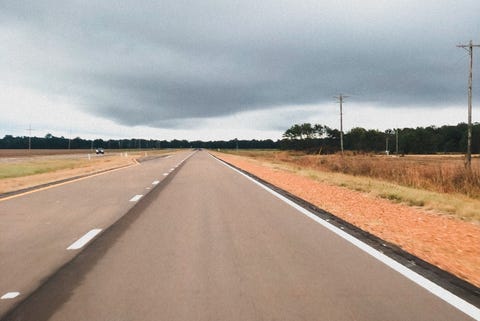
For a quick second I thought of growing up in South Bronx during the crack epidemic, where at 8 years old, walking home with one of my brothers—he was 10—we would encounter all sorts of danger. In those moments, our eyes would lock, little hearts thumping. We’d quietly calculate all the ways we could avoid the taunts, drug dealers, and bullies in our way. Like avoiding obstacles in a video game. Survival instincts would kick in. At times it would mean us running for our lives.
“Oh, I don’t need this.” The officer handed the receipt back to me.
My mind was still on 8-year-old me—there was no escaping this one. I wanted to cry and throw up.
License and registration?
I complied. I had lost. I prayed all the prayers I knew. I mostly asked God to see me through and keep on holding my tongue.
He disappeared to his car. The red and blue lights still swirled. Cars zoomed past. Alone, I looked around. Fighting to get confident me back. I reached for my phone on the dash and vent-texted my family’s group chat. “Got pulled over by the cops.” In the same breath, I FaceTime the group. No one had my time. “Entering Seattle. Great.”
Ba-bum. Ba-bum. Ba-bum. Ba-bum. The pounding louder. I reminded myself to breathe and leaned my head back. The car’s speakers vibrated. My eldest brother, in Nigeria, was calling back on FaceTime audio. He was at work.
“Rita! You okay? It’s cool. It’s cool. Okay? Don’t say anything. Just take the ticket and get out of there. Okay? Don’t say anything. Okay?”
I rambled and stuttered for minutes, to his calm and measured: “I know. It’s okay. Sorry. I’m sorry. Hang in there. You good? I’m so sorry this is happening to you.”
We sat in silence after he tried his best to bring me back. Tick. Tick. Tick. Tick. The hazard blinkers were sharp in my ears.
My brother asked, “Where is he now?”
It had been close to twenty minutes. I was grateful to be sitting in silence with my brother. Someone who knew how one instance of racial profiling could derail a life. He was profiled, jailed, and deported more than ten years ago. This phone call meant everything to me. I heeded his words because I knew he felt my grief.
“Still in his car. He’s probably trying to find something on me.”
My chest was rising and dropping quickly. I felt done with all of it—with America. No matter how good we are or try to be, we’d always be reduced to our Blackness. Yet that same Blackness had progressed from tokenism to plain ol’ accessory all year long, after George Floyd and the civil unrest that followed, in the guise of allyship or whatever else it’d been called. All to fit some predominantly white institutions’ agenda. An agenda that said, “Here, Black people, we are giving you a bit more permission to belong within our structurally white system.” To appease some ideological sense of America where racial and class divisions are nonexistent. An America that does not exist. Lifting a Black voice to save face dims the light of Black excellence and endangers real progress.
I stewed in that conclusion, in the BS of this America. I kept inhaling and exhaling deeply as my brother instructed over the phone. My eyes closed; I couldn’t help but think, Man, this right here is real life. Here was this white cop, being patronizing and condescending, pulling me over when I wasn’t speeding—racial protests rocking the country all around us.
No hashtag was going to heal the pain I felt or guarantee I got out in one piece. No elevation of some random Black man or woman to an obscure position would let everyday privileged America know that my value was inherent.
So why should we even bother with any of it? Why do I need permission to just let air into these lungs? I felt hard for all my brothers and sisters who face this every day. In my Upper West Side bubble, I rarely felt the overt nature of racism and prejudice: This made me feel more shame. If this was what it felt like to have a front-row seat to the fragmented, fractionated America in 2020, I didn’t want any of it. I wouldn’t survive it. That thirty-plus minutes led to prolonged shock.
My brother spoke: “It’s okay. Sorry. Okay? I’m so sorry.”
The cop returned and handed me a speeding ticket.
I wasn’t speeding.
I couldn’t faceplant fast enough on that bed once I arrived at the Moxy hotel on Republican Street. With my face buried in the cool, fluffy pillow, looking for comfort, I reviewed my mental list. Pep-talked my way through them. I needed to get back to myself as quickly as possible.
I sprang up. I couldn’t do anymore confined spaces. I rather boil in my thoughts while roaming the streets. It was a 30-minute walk to Cal Anderson, a park that had been taken over by protesters. I’d use the time to talk myself out of graduating to hot mess status. Maybe listen to some Jesus music.
Walking up to the park gave me time to purge my thoughts. It could’ve been worse, I thought. Some people don’t make it home after traffic stops. I intentionally focused on the cool, flying breeze, and took deep breathes.
I was desperate to engage with anyone. As I got closer to Cal Anderson Park, I saw a school bus ahead. It was painted black with IN OUTER SPACE WE TRUST and KENOSHA NINE inscribed in graffiti on its side and back, respectively. Young men and women—mostly Black, white, and Hispanic—were grouped in different areas of the park. Some knelt on the sidewalk spray-painting on white cardboard by the fence of the park. One had “RIOT” sketched out with “RIO” the only letters painted in black. Others were chowing down the day’s fixings: a poke-type bowl with eggs, noodles, beef, and vegetables. I approached three by the park's entrance: two women and one man standing directly across the bus.
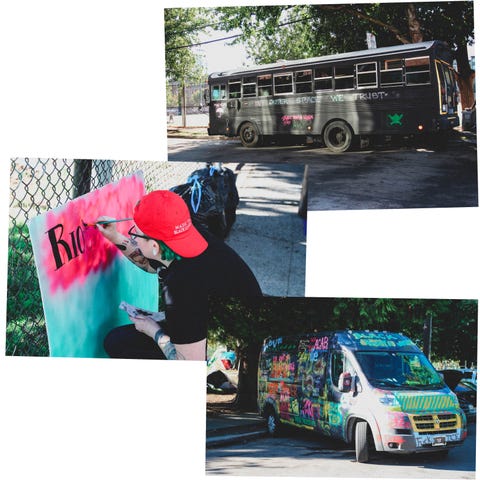
In the weeks following Floyd’s killing, protesters occupied Seattle’s Cal Anderson Park, a block from the East precinct on 12th Avenue, naming it Capitol Hill Autonomous Zone (CHAZ), also known as Capitol Hill Occupied Protests (CHOP). At various times the Seattle Police engaged the protesters with pepper spray, tear gas, and rubber bullets.
Maehem, who identifies as queer, had worked as a chef for over 15 years. She saw the communal sites set up to receive donations of PPE, snacks, and water for protesters, which were nice, but were not enough
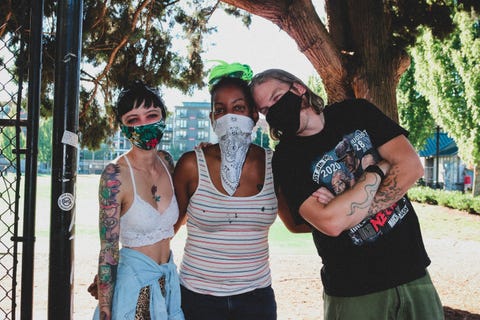
“I started making sandwiches,” she said.
Then she started making a lot more than that.
With some donated propane stoves and volunteers, she set up in a corner of the park and cooked all kinds of nourishment for the masses: stir-fry, chicken, vegetables, soups, wraps, tofu. All free to protesters and CHAZ occupiers, four times a day.
She called it Riot Kitchen. The effort is crowdfunded through a Venmo account and donations of food and supplies.
“The space started with the garden,” she said, turning to point behind her, deep into the park. She later built the makeshift kitchen in between the bathrooms and Shelterhouse—an event space—in the park. “We were feeding people almost twenty-four hours a day.”
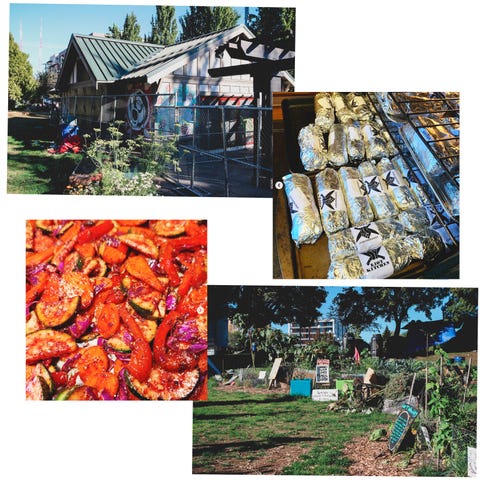
In August, the Kitchen crew had a plan: They would go to as many cities as they could where protesters were taking to the streets and feed them. “We were going to be in D.C. for the anniversary of Martin Luther King’s ‘I Have A Dream’ speech,” Maehem said. The march on Washington was on Friday, August 28. As they began their trip, they decided on a detour once they heard about Jacob Blake’s shooting on August 23. “Since we were close, we thought, ‘Oh, we’ll just go up to Kenosha and we’ll still have time to make it over to D.C.’ Except we got arrested.”
They’d arrived at the Speedway gas station in Kenosha that humid Wednesday, with one minivan, a truck, and the Riot Kitchen school bus. Both the bus and truck were painted black because Maehem’s intent was that “everywhere we stopped, I would find local artists at protests to cover it with art.”
The driver of the truck got out to pump gas, but “the pumps were [turned] off for the protest because people were lighting things on fire,” Maehem said. Seconds later, the station flooded with mostly plainclothes men and women with guns drawn, storming out of black Jeeps and SUVs, most without any discernible license plates.
Some of the videos of the scene went viral. The Riot Kitchen minivan was stopped before entering the gas station on 30th Street, Maehem said. In the video, the car is flanked by two unmarked black Jeeps—one on the driver’s side, another in front.
Riot Kitchen HQ just learned that our bus crew was arrested in broad daylight in #Kenosha today - kidnapped by feds in unmarked vans.
We are currently trying to find our friends who were just there to feed people.
Please share and donate for bail via Venmo riotkitchen206 pic.twitter.com/o2TDbohvFl
— riotkitchen206 (@riotkitchen206) August 27, 2020
“Get the fuck out! Open the fucking door!” Officers from different agencies, as reports later identified them to be, screamed at the van. An armed female official smashed the front passenger window with a long object. Another white man, wearing a white T-shirt, dark cargo pants, and a black ski mask, hopped out of the black Jeep by the driver’s side. He attempted to break the driver’s window, then tugged at the door handle: “Open! Get the fuck out!
Another officer got in front of the minivan, his left leg up on the front bumper. His gun pointed at the driver. More yelling.
Moments later, the passengers are forcibly dragged out.
Back at the Speedway, Maehem was on the driver’s seat of the bus, looking out the window, trying to figure out what was happening. She saw officials roll up on the truck driver who was still attempting to pump gas into the truck.
“‘Get on the ground! Get on the ground!’” Maehem recalled hearing them scream at him. She saw him lay on his stomach on the concrete, and watched as the men and women kept their guns drawn on him.
“They looked like a motorcycle gang,” she said. “Unidentified, all of them. It was so crazy.”
The media release from the Kenosha Police Department later said they “received a citizen tip alerting us to several suspicious vehicles with out of state places meeting in a remote lot near State Highway 50 and Green Bay Road.”
As her mind raced, more law enforcement corralled the bus she was in.
“‘Get out the fucking bus!’” What looked like a sea of them standing by her driver’s window yelled. As Maehem got out and turned away from the door she had just flung open, all she remembered was the gun pointed at her face.
One by one, the rest of her crew got out—all of them with their hands up.
“Why are we being arrested?” Maehem and her crew began asking in the bustle. “Why are we being detained? What’s going on?”
All were met with more silencing yells: “Keep your hands up! Stay down!”
The officers from the different agencies never identified themselves, Maehem said.
“They thought we were Antifa,” she added, a conclusion she made from watching the news later on. “They thought we were trying to fill up little containers of gasoline for violence, which is not true at all.” The one “little gas can” they had, she said, was for the food truck’s generator, but none of the officials ever asked them. Anything.
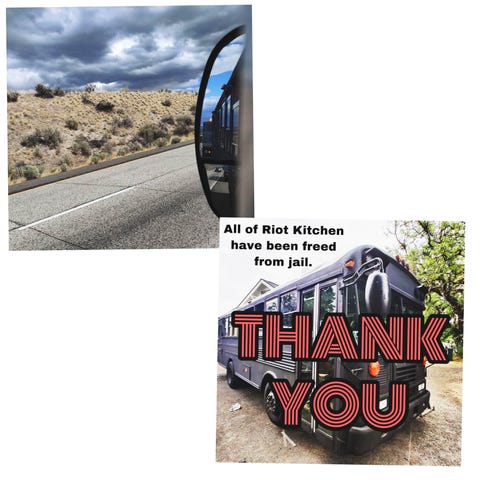
As Maehem retold the story, breathless, neck veins popping at times, of another day living while Black in America, I was still processing the anger I carried from my encounter with the white officer. My heart felt out of control. I kept swallowing hard. I was back in that Buick with the officer standing at my window. Since the stop, I’d been trying to figure out why this black skin continues to impede our intrinsic value.
We are ambiguously free, and America thrives on that segmentation.
The Kenosha Nine, as they were later called, were detained at an ICE detention center. It was crowded and “cold as hell in there. They didn’t book us till the [next] morning.” Still, no one had told them why they were being detained. “They wouldn’t tell us anything,” she said. When they were finally released two days later on August 28, having been booked with disorderly conduct, the officials at the detention center “tell us they don’t know where our stuff is because they don’t know who brought us in.”
They had to stay in Milwaukee for three weeks without their cell phones or personal belongings because their three vehicles were still being held for inspection. “And then we get them back, and they were trashed.” They had to spend more time in Wisconsin to clean and reorganize everything.
“It’s been an adventure and a half,” she said, her eyes and cheeks meeting in a smile.
She walked me over to where she first started the garden that grew into Riot Kitchen. It was still full of tents and some houseless people.
As we reached the now-fenced area inside the park, across from it was a Black Lives Memorial Garden, signs painted with names I did not know. I supposed no video went viral for these Black women and men, such as Queasha Hardy, a trans woman fatally shot in Louisiana.
Past the signs, at the entrance of Maehem’s old makeshift kitchen, two blue water barrels behind her, she adjusted her ink-stained striped tank top. She had hopes of building a farm-to-table kitchen with food from the park’s garden: “That was the dream but things didn’t go that way.” Once police swept the area months ago, protesters stopped occupying the park. Her hands clasped in front of her—her left forearm with a BADNEW tattoo—eyes squinting at the blinding sun, she took a beat, staring off into the park.
“In general, I feel unsafe,” she said.
In that moment, standing next to a woman who has had a gun pointed at her for the offense of being Black, it seemed so simple: People of color just want to live free, I thought, as Maehem expressed feelings of unsafety. We simply want the same opportunities as everyone else, to not be repeatedly reduced to stereotypes based on our skin color. It fetters our abilities to just... be and live.
In general, I feel unsafe.
In general.

Living as a Black person in America has its levels of rage.

